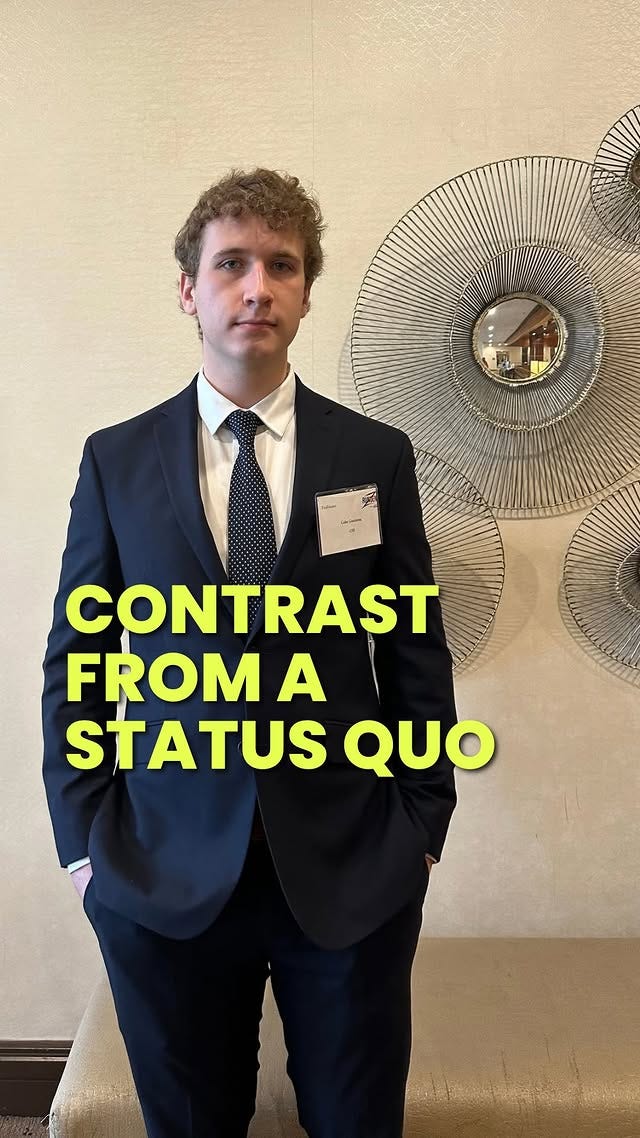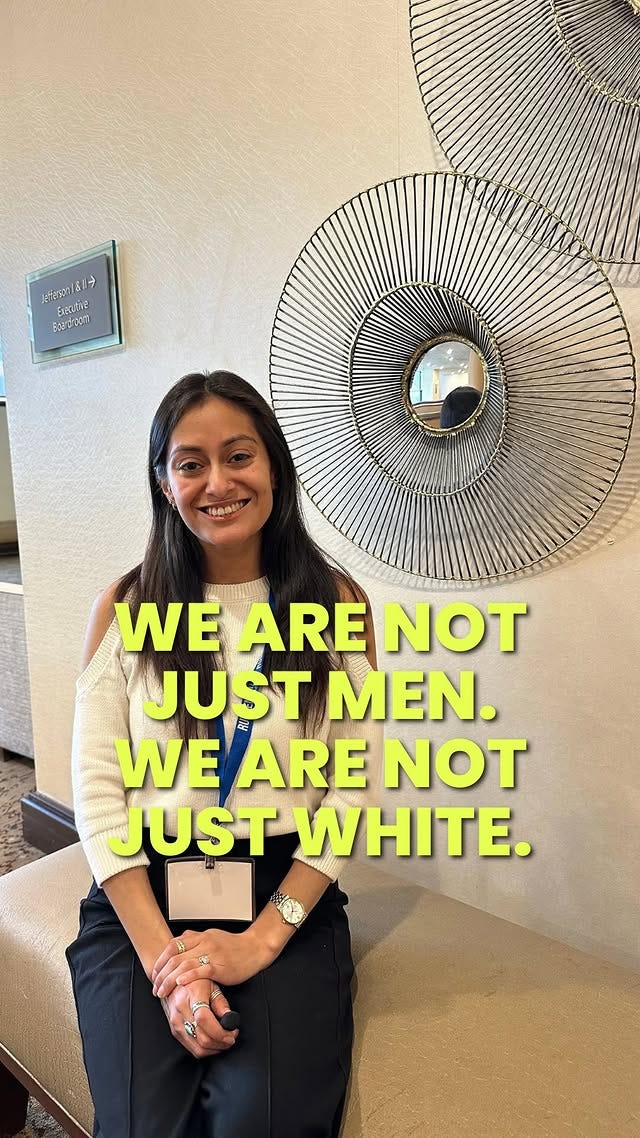What Gen Z and millennial conservatives are saying...
Tidbits from Run GenZ's conference with young conservative leaders show that nostalgia for a time period they don't even know drove young people to the right. But they won't necessarily stay there.
Last week, I went to Run GenZ’s conference for young conservative leaders in Arlington, Virginia. For those unfamiliar, Run GenZ is a group that recruits, trains, and mentors young conservatives running for state and local offices across the country.
I’ve been following the group since it launched in 2020, and the folks in their network span the conservative ideological spectrum. At the conference, I spoke with a range of guests (in total, there were ~120 attendees ~90 men, 30 women, from 37 states) and sat down for a listening session with eight newly elected officials.
💡 My biggest takeaway is that young conservatives are nostalgic for a time period they’ve never personally experienced.
President-elect Donald Trump made notable inroads with young voters this year. While Vice President Kamala Harris still secured the youth vote overall with an 11-point margin, it marked the Democrats’ weakest performance with this critical voting bloc since 2004, when they held a 9-point advantage.
So as one might expect given this group’s background, the vibes were high. There was excitement and optimism in the air. Blaze Drinkwine, a 28-year-old city commissioner in San Antonio, Florida, told me he felt “a big sigh of relief” since Election Day. But what is it that these young conservatives are hopeful for? And what did they have to say about Trump’s gains with young voters?
Among everyone I spoke to, there was a huge emphasis on the economy and getting back to a time of American prosperity. If Republican politicians want to capitalize on their recent gains with young voters, the young leaders told me, they need to follow through on their promises and deliver results. That means actually cutting the budget, fixing the housing crisis, and bringing down prices.
There was also an appetite for economic populism. Trump may be a former president, but he’s still considered anti-establishment because he cares more about appealing to the masses than long-term party players. That resonates with young conservatives frustrated by business as usual. Gabe Guidarini, who’s 20 and attends the University of Dayton, said Trump brought him into the Republican Party in 2016 “because his ideas were geared toward the people in contrast from a status quo that was out of touch with the American people.” And Daniel Manieri, who’s 24 and from Pennsylvania, said he appreciates a renewed focus on bringing the working and middle class into the party. He said that “ties into the new brand that the Republican Party is offering, which is a more economic populist agenda,” and suggested potential support for “pro-family” policies like child tax credits (which from my POV, could be a place where Democrats and Republicans end up agreeing).
In the listening session, I asked the young leaders what they feel differentiates younger Republicans from older Republicans.
Randyn Gregg, who’s 33 and a recently elected state Rep. in Montana, told me “Republicans are falling in love with America again,” adding, “it’s like a enlightenment of American principles.”
“Young millennials and Gen Z… we want the insanity to stop. We want something that's real, that we can touch. There's a harkening back to tradition,” Gregg explained. “We see that in the faith sphere, for example. And that is on the rise. People are wanting to read the Bible. What are these fundamentals that America is based off of that have allowed the constitution to actually happen and the experiment of America to occur?”
Askar Mirza, a 20-year-old commissioner of parks and public property in New Jersey, said bluntly: “I don’t remember the again. The first election I can remember clearly is 2016. I have never lived in a pre-Trump world.”
I asked the young conservatives where their nostalgia comes from — especially if they were too young or not alive to have a memory of the world-order they speak so fondly of. Their answers were largely rooted in technology and a comparison to the premise of the American Dream.
“When you spend your life in a six-inch screen or whatever you may have, you crave real human connection,” Mirza said. “Human beings need to talk to each other face to face, they need to have real communication, go outside, put your phone down. These are not radical concepts. It's just, we've forgotten them. They haven't been passed down effectively, and we're refining them.”
“It’s economic too. We know there was a time when you could afford to buy a house, you could afford to have a family. You could afford to do all those things that the American Dream told you back in the day. But right now, my generation is just struggling to get started,” said David Thomas, an incoming state Rep. in Ohio.
On the American Dream 🇺🇸 💭
Given the way the young conservatives described our current state of affairs as one of such doom and gloom, I asked the group if they do in fact believe in the American Dream. There was a unanimous yes — but an acknowledgement that they may have felt differently had Trump lost the election.
From his perspective, Steven Villela, 27 and a county commissioner in Texas, said the election showed a clear dichotomy in messaging. “You had two ideas. You're the problem. We need to be nicer to everyone and love everyone. And America's amazing. Let's just keep being amazing and working for better,” Villela said — he chose the later.
Reading between the lines, while the young leaders denied the idea that the American Dream is tied to any one single person, it seemed to me that their hopefulness is currently rooted in their vision for what a second Trump term could look like. So while they may not say the American Dream and Trump go hand in hand, in their eyes, politicians (or leaders who talk about change) are critical to fostering American prosperity — especially during a time of so much turmoil and crisis. And let’s be real, this generation has grown up amid constant crisis. When it comes to politics, Trump’s “Make America Great Again” rhetoric has led them to believe there was a before-time, maybe even before they were born, that is worth trying to recreate.
But despite their loyalty to Trump this year, these leaders seemed issue-focused (primarily on the economy) — and said their allegiances aren’t set in stone.
“I would say the Republican Party is in deep trouble if they don’t deliver because voters will remember it, especially now with the younger generations being a bigger bloc,” Drinkwine said.
“We’ll still vote our values. But I think our generation will either not vote,” said Thomas, “Or we’ll see more of our generation jumping in and challenging people in a primary,” said Cody Shook, a sheriff-elect in Texas.
Meanwhile, Alyssa Brown, who’s 27 and was recently elected to the Arkansas state House of Representatives, said she wants to see Republicans make more room for younger leaders.
“As Republicans, we haven't always been the best at that. Sometimes, it's messy, and you have to give them chances. But welcome new, young voices,” Brown said.
“I was fully supportive of Trump, and I'm voting for him over Harris any day of the week. But I think as Republicans, it's very important that we also hold the Trump administration accountable and that he is not this god, this idol that we can't criticize,” she said.
Here’s some more of what I heard:







One of the mystifying things about this election was the apparent shift of working-class voters and young voters, who tend to have entry-level and gig work, to the right. I get the disenchantment with the Democrats. But Republican policy--by which I mean their actual legislation and legal action--has, by and large, been anti-union and opposed to collective bargaining, opposed to wage increases, and opposed to workers' benefits (parental leave, telework, etc.). So I will be curious to see whether Republican policy actually becomes more populist and worker-friendly, and if it does not, how the voters who are expecting a pro-worker agenda will respond.
Want to hear from more young women. Want more knowledge wrt policy. What do you think about safety, e.g., guns, health care, family support? Let's hear from the women.
From a 77 yr. old Vietnam generation woman - kinda been there and done that, y'know?